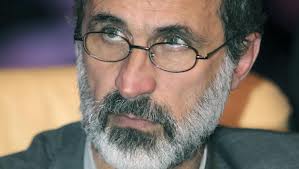 The leader of the opposition Syrian National Coalition (SNC), Ahmed Moaz al-Khatib, has resigned.
The leader of the opposition Syrian National Coalition (SNC), Ahmed Moaz al-Khatib, has resigned.
In a statement on his Facebook page, Mr Khatib said he was leaving the job as he wanted to work with more freedom than an official institution allowed.
He had promised the Syrian people he would resign if what he called certain red lines were reached, he said.
He appeared to criticise the world community for not doing enough to stop two years of bloodshed in Syria.
His resignation comes a day after European Union foreign ministers failed to resolve their differences over whether to exempt Syrian rebels from an arms embargo.
Mr Khatib, who was elected head of the SNC in November 2012, is seen as a respected and unifying figure in Syria.
But he caused controversy by offering talks with Syrian President Bashar al-Assad, on condition that 160,000 prisoners were freed.
The opposition had previously insisted President Assad step down before any talks begin.
‘Vicious regime’
Mr Khatib’s resignation comes days after Ghassan Hitto was chosen as prime minister in rebel-held areas, an appointment that he is thought to have objected to.
But he said he would continue to work with colleagues who were seeking the freedom of the Syrian people.
“I announce my resignation from the National Coalition, so that I can work with a freedom that cannot possibly be had in an official institution,” he said in the statement.
“For the past two years, we have been slaughtered by an unprecedentedly vicious regime, while the world has looked on,” Mr Khatib added.
“All the destruction of Syria’s infrastructure, the detention of tens of thousands of people, the forced flight of hundreds of thousands and other forms of suffering have been insufficient for the international community to take a decision to allow the people to defend themselves.”
BBC Middle East analyst Sebastian Usher says a key reason for the international community’s concern is anxiety over divisions within the Syrian opposition itself, and Mr Khatib’s action may only intensify those concerns.
In a separate development, the rebel Free Syrian Army announced that it was refusing to recognise Mr Hitto, saying he had been forced on the opposition coalition and not adopted by consensus.
In last Monday’s vote in Istanbul, Turkey, Mr Hitto won with 35 out of 48 votes, in what coalition leaders described as a “transparent, democratic” election.
But some senior coalition leaders are reported to have withdrawn from the vote in protest over Mr Hitto’s lack of military experience.
BBC

Leave a Reply
You must be logged in to post a comment.